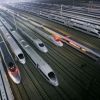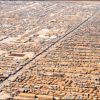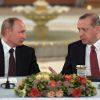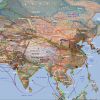-
 +19 +1
+19 +1China plans 30,000-km high speed rail network by 2020
The Chinese government plans to expand the country's high-speed rail network to 30,000 kilometers (18,600 miles) by 2020, part of public infrastructure spending aimed at shoring up economic growth. The network would connect more than 80 percent of China's major cities, Vice Transport Minister Yang Yudong said. Last year, China's high-speed railway totaled 19,000 kilometers (11,800 miles).
-
 +34 +1
+34 +1Neoliberalism – the ideology at the root of all our problems
Financial meltdown, environmental disaster and even the rise of Donald Trump – neoliberalism has played its part in them all. Why has the left failed to come up with an alternative?
-
 +43 +1
+43 +1Is Universal Basic Income a Good Idea? Stick Around, Because We're About to Find out
Upcoming UBI programs in Canada, Finland, Uganda, and other countries are very likely to tip the scales in the universal basic income debate one way or the other in 2017. Whether or not UBI is it, we need to find a solution to the problems that are inevitable as automation and AI replace human workers in the coming years.
-
 +27 +1
+27 +1A New Study Shows How Severe Inequality Is — and How Little We’re Doing About It
The average income for the bottom 50 percent is the same as in 1980 — while the average income for the top one percent has more than tripled. By Eric Levitz.
-
 +23 +1
+23 +1We don’t have students any more – just customers
With the globalisation and deregulation of trade, governments are increasingly susceptible to the influence of powerful commercial interests. Organisations such as the OECD, the World Bank and the EU mediate this influence and thereby exercise in direct control over national higher education systems. Over the past 20 years, several OECD, EU and World Bank reports proclaim the universities to be the intellectual engine of a global economy rather than a global society.
-
 +14 +1
+14 +1The Retreat from Hyper-Globalization – What’s The Future?
Flows of Goods and Services, People and Capital Have Overwhelmed the Ability of Political Processes to Accommodate Them. By William H. Janeway.
-
 +35 +1
+35 +1The Soviet Union collapsed overnight. Don’t assume western democracy will last for ever
The liberal order could fall apart just as suddenly as the USSR. If we want it to survive, we have to learn from what happened in Russia. Below the medieval citadel in Kazan, two vast frozen rivers turn the landscape white. On a Saturday afternoon there are a few hardy locals shuffling through the icy sludge to take selfies against the mosque, the Christmas lights and the Soviet-era statues.
-
 +2 +1
+2 +1The Archdruid Report: The Free Trade Fallacy
“A country that withdraws from free trade agreements and reorients its economy for the production of goods for domestic consumption might thus expect to see some improvement, not only in the prosperity of its working people, but in rates of return on investment.” By John Michael Greer.
-
 +11 +1
+11 +1Multipolar World Order, Economics versus Geopolitics: The Beijing-Moscow-Tehran "Triple Entente"
International tensions have in recent years often led to conflicts between nations, leaving countries to face complicated choices. The world is under constant change, and the most direct results ar...
-
 +26 +1
+26 +1How Hyperconnected Cities Are Taking Over the World
We’re now moving toward a new era where insular, political boundaries are no longer as relevant. More and more people are identifying as “global citizens,” and that’s because we’re all more connected than we’ve ever been before. As a result, a “systems change” is taking place in the world today in which cities—not nations—are the key global players, argues Parag Khanna in his new book, Connectography: Mapping the Future of the Global Civilization.
Submit a link
Start a discussion




















